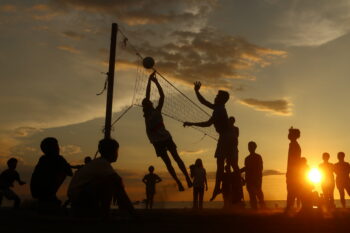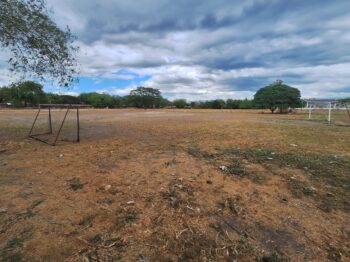
DAVAO CITY (Mindanews / 20 February) A video showing Lumad children crying for help, as they were forcefully taken away from the University of San Carlos in Cebu City, by operatives of the Philippine National Police Central Visayas, was not only painful to the sight and ears, but more to the heart.
Around 26 Lumad children and teachers were taken into custody by police in the morning of February 15 allegedly for undertaking a “warfare training” in the aforesaid school. The administration of USC also categorically denied the accusation, the truth being according to them was that the children were taken in as part of their Bakwit Skwela Program where no one was held against his or her will.
On one hand the police claimed that it was a “rescue” while on the other hand, human rights groups called it a “raid.” However this operation may be called, one thing is clear – the Lumad children are again caught in the middle of a conflict, one that is primarily borne of wrong assumptions, ill intentions and perhaps prejudiced interpretations. In the end, it is the children that shall bear to suffer the consequences of conflict not of their own making. The voices of the Lumad children in this case must be central to the conflicting claims.
The Armed Forces of the Philippines has always accused the Lumads of being members or at least supporters and protectors of the New People’s Army (NPA). In fact, they are often tagged as recruiters for the NPA. This vilification and red-tagging of Lumads is nothing new as previous similar incidents have been documented involving IP schools in Mindanao. Therefore, if the Supreme Court affirms RA 11479 or the Anti-Terror Act of 2020, having an overbroad and vague definition of terrorism, it is not impossible that more Lumad children will have to suffer from the militaristic approaches to a “rescue operation” in the future. It is clear the law has now left a chilling effect even into the Lumad children’s right to education.
With the ongoing counter-insurgency operations of the government against the rebel group, more and more Lumad children will be displaced from schools. As of June 2018, Save Our Schools Network (SOS) revealed that 72 schools for the Indigenous Peoples in Mindanao are still closed due to the ongoing military operations against the NPA. This militarization is further aggravated with the cessation of the peace talks between the Government of the Republic of the Philippines (GRP) and the National Democratic Front of the Philippines (NDFP), the political arm of CPP-NPA.
Unfortunately, the hostilities are hosted by the indigenous peoples in their ancestral domains and many of them are displaced if not dying from wars beyond their control. The brunt of war is generally borne by children having to struggle doubly hard on account of not only fleeing from the security risks but also giving up their dreams of finishing school.
In Davao Region, Lumad schools have been affected in the areas of Talaingod, Davao del Norte and Compostela, Davao de Oro. MindaNews reported that close to two thousand Lumad students are no longer in schools following their closure due to the threat of armed conflict. In fact, SOS claims that some of the schools have been converted into military encampments further displacing hundreds of children. Of the 19 schools in Talaingod and Kapalong, Davao del Norte, only two remained in operation to date. This perhaps, may be the reason that these Lumad children chased their dreams and found hope in the Bakwit Skwela program of USC in Cebu – a dream only to be killed again.
Schools where children dream of a bright future, must be treated as “zones of peace” at all times. As a zone of peace, it means that it is not merely a “demilitarized zone” but a sanctuary that operates within the principles of nonviolence, free from weapons, injustice and environmental degradation (RA 11188, Children is Situations of Armed Conflict Act). It is a space where one is free to explore the different expanse of knowledge free from fear, censorship, reprisal or vindication. If true that no warrants were served nor any coordination with USC’s administration on the planned “rescue operation,” then it leaves all the rest of our schools at risk in the hands of our law enforcers.
The University of San Carlos, as it is with all Higher Education Institutions in the country, enjoys a constitutionally guaranteed academic freedom [Article XIV, Section 5 (2)] finding support in a legion of jurisprudence (Ateneo de Manila vs Capulong; Miriam College Foundation vs. CA; Camacho vs. Coresis) from the Supreme Court. Academic freedom must be underscored as the energy that drives a school towards its vision and mission. For without it, the truth, which is the primary business of a school, can only be a blurry abstraction.
While it bears emphasizing that academic freedom cannot be used to shield acts that are patently illegal, grossly immoral and contrary to customs and public order, its intrinsic value of promoting the intellectual integrity of the school in service of the common good cannot be stressed more than enough. It has contributed so much in promoting social justice through the school’s excellent instruction, robust research and vibrant community engagement that benefits society to a larger extent. Hence, Red-tagging, red-baiting and other forms of vilification emboldened by an ill-conceived anti-terror law, cultivating a culture of silence and killing the national discourses, are the exact anti-theses to academic freedom.
With the ATA’s effect on academic freedom, who shall be the winners here? None. Instead, the children shall stand to lose and in this case, the Lumad children who were “rescued.”
(MindaViews is the opinion section of MindaNews. Upper Right Hand is a revolving column of the Union of People’s Lawyers in Mindanao (UPLM). Atty. Romeo T. Cabarde, Jr. is a faculty of the Political Science Department and the Director of Ateneo Public Interest and Legal Advocacy Center and Assistant to the President for Advocacy and Legal Affairs of Ateneo de Davao University)







